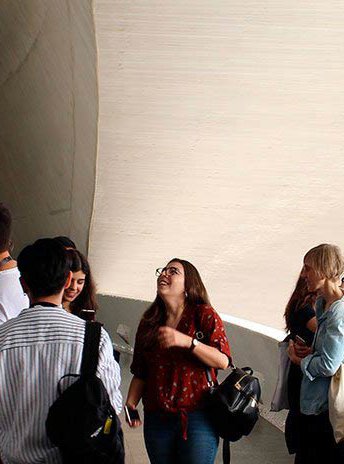Research
Thanks to the professors across our various degrees, the School of Architecture generates new knowledge that adds value to the discipline, which is what really sets higher education apart from other forms of learning. For this reason, the School of Architecture is committed to research as part of its professional mission, generating new knowledge in each area being studied in the different degrees and applying it to both programme content and teaching methodologies.
Research Topics
Regeneration of and Spotlight on Heritage as a Cultural Tourism Product
In Research Topic #1, investigations are focused on movable and immovable assets of high archaeological, artistic, architectural, and ethnographic value, demonstrating that the passage of time and our current perception of cultural heritage have transformed them into effective witnesses to the trajectory of history’s unifying and multifaceted character. The elements of traditional architecture and classical city planning have great historical and ethnographic significance, constituting a fragile testimony from our ancestors that we must bequeath to future generations with full guarantees of longevity. These are also clear examples of sustainable architecture and environments, with lessons still applicable in our current, complex built environment.
Architectural Design and Urban Planning Strategies for the Revitalisation and Consolidation of the Cultural Landscape of Tourist Areas
Research Topic #2 focuses on studying the cultural landscape with the main aim of developing a better awareness of the natural, ecological, environmental, cultural, and economic values of the different landscapes from their relationship with the uses of the territory. This is done to involve different levels of administration, sectors of activity, and social groups in the assessment, maintenance and improvement of cultural landscapes, all from the standpoint of the possibility of a better, more integrated management of the local area and greater social participation.
Energy Rehabilitation in Buildings
Research Topic #3 focuses on conducting research on measures to comply with the Kyoto Protocol (Japan), and the European Directive 2012/27/EU on energy efficiency. This work studies every part of a building: its construction system and the materials used, referencing buildings from traditional architecture, and based on different strategies of passive architecture, with well-placed and oriented constructions, suitable envelopes and sustainable or even reused materials to enable zero energy consumption in artificial air conditioning (cooling and heating). On the other hand, hotel and tourist buildings in sunny, coastal tourist areas, based on the same construction systems as conventional residential construction, generate significant energy consumption due to the need for artificial air-conditioning to achieve standards of comfort accepted by tourists.
Reinterpreting conventional and tourist buildings in these Atlantic coastal areas based on the criteria or strategies of traditional bioclimatic architecture—such as thermal inertia, solar protection and ventilation—could be a sustainable energy solution for the Canary Islands archipelago. Moreover, this should not be a deterrent to the incorporation of renewable energies and reused materials with higher thermal efficiency, allowing a drastic reduction in both the ecological footprint and the consumption of primary energy generated by thermal power plants from fossil fuels and pollutants.
Architecture and Sustainable Tourism Development – Research Group
The ‘Architecture and Sustainable Tourism Development’ (ASTD) group structures their research topics from the balance between the consideration of the different profiles or research paths, and development of transversal projects across the three programmes within the School.
Group Members
- Juan Diego López Arquillo. Full Professor (PI)
- Cristiana Pereira Teixeira de Oliveira. Full Professor
- Fernando Martínez Soto. Full Professor
- Esther Ferrer Román. Full Professor
- Cosmin Gabriel Bolea. Professor. Doctor. Accredited
- Fermín Delgado Perea. Professor. Doctor. Accredited. (On leave of absence)
- Pablo Souza Sánchez. Professor. Doctor. Accredited
- Jorge Heras Sánchez. Professor
- Adriana Dacosta Yuele. Professor
